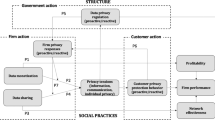Abstract
We report data from the first representative national phone survey of Americans' perceptions about nanotechnology (N =1536). Public opinion about nanotechnology is in its infancy, and knowledge about it is quite limited. Yet, Americans' initial reaction to nanotechnology is thus far generally positive, probably rooted in a generally positive view of science overall. Survey respondents expected benefits of nanotechnology to be more prevalent than risks, and they reported feeling hopeful about nanotechnology rather than worried. Their most preferred potential benefit of nanotechnology is “new and better ways to detect and treat human diseases,” and they identified “losing personal privacy to tiny new surveillance devices” as the most important potential risk to avoid. The most discouraging aspect to the data is respondents' lack of trust in business leaders to minimize nanotechnology risks to human health. Overall, these data indicate that while Americans do not necessarily presume benefits and the absence of risks, their outlook is much more positive than not.
Similar content being viewed by others
References
Bainbridge W.S., 2002. Public attitudes towards nanotechnology. J. Nanopart. Res. 4, 561–570.
Colvin V., 2004. (March10), Responsible nanotechnology: Looking beyond the good news. EurekaAlert!, Essay 1102 (http://www.eurekalert.org).
Couper M.P., 2000. Web surveys: A review of issues and approaches. Publ.Opin.Q. 64, 464–481.
Crichton M., 2002. Prey. Harper Collins, New York.
Delli Carpini M.X. & S. Keeter, 1989. What Americans Know about Politics and Why it Matters. Yale University Press, New Haven.
Ferber D., 1999. Risks and benefits: GM crops in the cross hairs. Science 286, 1662–1666.
Gaskell G., M.W. Bauer, J. Durant & N.C. Allum, 1999. Worlds apart?: The reception of genetically modified foods in Europe and the USA. Science 285, 1664.
Kaplan M.F. & L.E. Miller, 1987. Group decision making and normative versus informational influence: Effects of type of issue and assigned decision rule. J. Pers. Soc. Psychol. 53, 306–313.
Leggett M. & M. Finlay, 2001. Science, story, and image: A new approach to crossing the communication barrier posed by scientific jargon. Publ. Understanding Sci. 10, 157–171.
Marcus G., 2002. The Sentimental Citizen: Emotion on in Democratic Politics. Penn State University Press, University, Park, PA.
Marcus G. M. MacKuen & R. Neuman, 2000. Affective Intelligence. University of Chicago Press, Chicago.
Meyers R.A., 1989. Persuasive arguments theory: A test of assumptions. Human Commun. Res. 15, 357–381.
National Academy of Sciences, 2000. Genetically modified pestprotected plants: Science and regulation. Committee on Genetically Modified Pest-Protected Plants, National. Research Council, National Academy of Sciences, Washington, DC.
Page B.I. & R.Y. Shapiro, 1992. The Rational Public. The University of Chicago Press, Chicago.
Priest S.H., 1995. Information equity, public understanding of sciences, and the biotechnology debate. J. Commun. 45, 39–54.
Robins R., 2001. Overburdening risk: Policy frameworks and the public uptake of gene technology. Publ. Understanding Sci. 10, 19–36.
Roco M.C., 2003. Broader societal issues of nanotechnology. J. Nanopart. Res. 5, 181–189.
Roco M.C., & W.S. Bainbridge, eds., 2001. Societal Implications of Nanoscience and Nanotechnology. Kluwer Academic Publishers, Dordrecht, The Netherlands.
Tytler R., S. Duggan & R. Gott, 2001. Public participation in an environmental dispute: Implications for science education. Publ. Understanding Sci. 10, 343–364.
Author information
Authors and Affiliations
Rights and permissions
About this article
Cite this article
cobb, M.D., Macoubrie, J. Public perceptions about nanotechnology: Risks, benefits and trust. Journal of Nanoparticle Research 6, 395–405 (2004). https://doi.org/10.1007/s11051-004-3394-4
Issue Date:
DOI: https://doi.org/10.1007/s11051-004-3394-4




